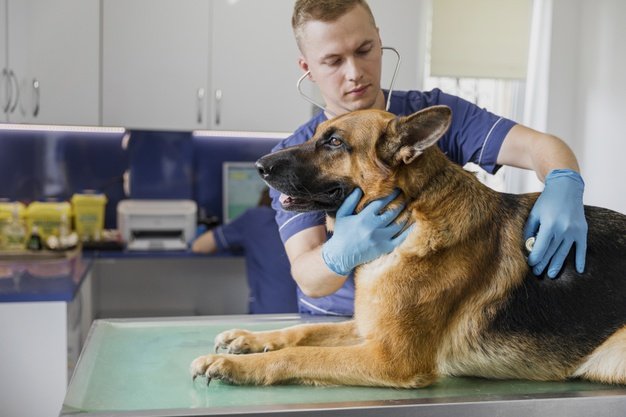Is your dog itching and shaking like hell? Does he suffer from a recurring ear infection? The symptoms point towards food allergy and a visit to the vet might be in order.
Allergies, be it skin or food, can be devastating and frustrating for you as well as your fluffy-friend. The non-stop scratching of ear, face, and paws can drive him crazy. Make sure you are covered with dog insurance if you want to be prepared for these situations.
Now, you must be wondering where did these allergies come from when your pet is vaccinated regularly and eats healthy?
Really!
Is your pet really having a healthy diet? Ponder-upon! Unlike humans, a dog’s food is different. You could be taking your pet toward distress if you are feeding him food he is allergic to. For many dog owners, dog allergies related to food are a rising concern.
As a dog owner, it’s important to know that food allergy and food intolerance both are different. While food intolerance leads to poor digestion, food allergies are the result of your dog’s immune system’s response to an invading problem.
How do you know he is suffering from a food allergy?
If your dog is showing the following symptoms, he/she might be suffering from a food allergy:
- Itching
- Paw biting
- Obsessive licking
- Poor coat quality
- Chronic ear inflammation
Some other symptoms of food allergy in dogs are:
- Skin Rashes
- Chronic diarrhea
- Itchy rear end
- Vomiting
- Chronic gas
- Nausea
- Hives
Now, if your dog is showing the above symptoms and is diagnosed with a food allergy make sure you keep him away from foods like:
Dairy:
Some dogs are dairy intolerant and have problems digesting lactose. This further can lead to problems like diarrhea, vomiting, and gas which a dog suffers from. A dairy allergic dog may also have skin itchiness or paw itching.
Wheat:
People have so many misconceptions about carbohydrate-containing foods such as grains that are made for dogs. Some dogs show an allergic reaction to wheat, so if your pet is one of them, consult a vet and treat your loving fluffy pet.
Eggs:
Egg allergy in dogs means your dog’s immune system is overreacting to the protein which presents in the egg yolk. However, for this allergy, you don’t have to visit a vet, just avoid giving them and your monster will be fine.
Beef:
Dogs mostly suffer from protein allergies. Also, if you are feeding the same food over and over, the chances are that your dog will develop an intolerance or allergy to those foods. And food like beef is one such. However, to avoid this, don’t repeat the same food over and over. Instead, run the repeat cycle after 4-5 days.
Chicken:
Like beef, offering your dog only chicken over and over will make them intolerant to that.
Lamb:
Since many dog foods are made from chicken or beef, lamb can be a healthy option for your pet. However, some pets still experience allergies to this meal. But you can try sweet potato, rice or mix with some other food to avoid allergies.
Soy:
Offering soy to dog’s can cause various health issues that are beyond allergies. Your pet may face problems like thyroid, liver disease, and much more.
Which Breads are More Prone To Allergies?
Although no specific breed is prone to allergies, some of the most common breeds are:
- Collie
- Soft-coated Wheaten Terrier
- Boxer
- Cocker Spaniel
- Springer Spaniel
- West Highland White Terrier
- Shar-Pei
- Dachshund and much more
Although it’s overwhelming to have a cute, cuddly monster at home, taking good care of them is a job that needs attention and dedication. Following a proper diet can keep allergies at bay, but in case if your pooch does catch one, Benadryl is a good OTC drug that you can also give to your dog. CertaPet features a very detailed article covering everything you need to know about Benadryl for dogs – make sure you read it.
Read More:
























